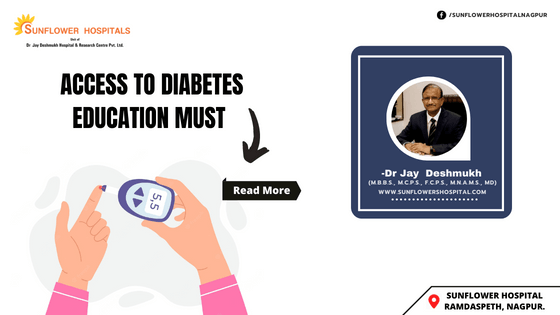Why is the day celebrated on November 14 every year?
This was the birthday of Sir Frederick Banking. He along with many others co-discovered Insulin in 1922. Ever since then, it has remarkably changed the management of diabetes and saved many precious human lives the world over. In many Asian countries, diabetes is taking a heavy toll on young people. Proper education about the diagnosis, symptoms, care, exercise, nutrition, and medications is essential to improve the quality of life of diabetics and also to increase their life span.
What are the main complications of diabetes?
The complications are mainly due to blood vessel involvement. This may include heart attacks and heart failure, kidney involvement and progressive kidney failure, and an increased risk of retinal injuries and brain strokes. Involvement of nerves may cause leg cramps, and burning sensation at the feet, and may reduce sensation at the feet. This may lead to trivial injuries not being recognized and diabetic foot infections and even gangrene in some cases. Erectile dysfunction is common in males due to long-standing diabetes.
What about infections in diabetics?
Uncontrolled diabetes can lead to fungal infections of the skin and genitals. Tuberculosis is another important infection in diabetics. Urinary tract infection, external ear infection, and in fact all common infections may have an aggressive course in uncontrolled diabetics.
What is the ABC in diabetes care?
A stands for HbA1 C. This is the glycosylated haemoglobin. This should be kept below 7%. This averages the previous 3 to 4 months of blood glucose control. B stands for Blood pressure. Ideally, the BP should be kept below 140/90. C stands for cholesterol. The bad cholesterol that is LDL cholesterol should be below 100 mg, and ideally 70 mg. Other than this, an annual retinal examination, annual blood, and urine tests. For 2022 the theme is access to diabetes education. The day is celebrated on 14 November under the leadership of the World Health Organization. Educating individuals and their families about appropriate diabetes management is of paramount importance. This education may prevent the epidemic of the disease in India and make way for better management. For kidney function and a detailed cardiac assessment on a yearly basis is suggested. The cardiac examination may include ECG, stress ECG, echocardiogram, and CT angiogram in selected cases.
Who is at the greatest risk of diabetes?
Individuals who have a family history of diabetes, those who are obese, and sedentary, women with PCOD, gestational diabetes, and hypertension, and those on long-term steroids are likely to get diabetes. However, those who have no family history of diabetes and those who exercise regularly and are underweight can also get diabetes. Hence, getting your blood glucose every 6 months after the age of 25 years is recommended.
Can you prevent diabetes?
There are millions of people in India who are in the prediabetes range. Their post-meal blood glucose is between 141 mg to 199 mg. Their fasting glucose is from 100 mg to 126 mg. They are likely to become diabetic in the near future. Reducing weight, having appropriate dietary restrictions, exercising regularly, avoiding stress and smoking, and having adequate sleep may prevent diabetes in them. This is also important in women with diabetes during pregnancy and polycystic ovarian disease.
How do you get an education in diabetes care?
There are many portals available. The media, electronic media, seminars, and the internet are all available to impart education. You must discuss with your doctor every aspect of diabetes and get effectively treated. Home monitoring of blood glucose and blood pressure is extremely significant in this regard. Having an annual check-up with respect to diabetes care is significant. Many heart problems, strokes, and kidney disorders are associated with diabetes. Blindness occurs commonly in uncontrolled diabetics. Complications in pregnancy are associated with uncontrolled diabetes. All these aspects related to uncontrolled diabetes and hypertension can be effectively improved by proper education of diabetics and their family members.
Author: Dr Jay Deshmukh
Dr Jay Deshmukh is Chief Physician and Director, Sunflower Hospital, Nagpur Honorary Physician to Honorable Governor of Maharashtra and PondicherryCentral. Dr Jay Deshmukh is an M.B.B.S., M.C.P.S., F.C.P.S., M.N.A.M.S., MD From Internal Medicine – Bombay and New Delhi.


